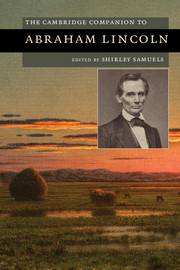Book contents
- Frontmatter
- Introduction
- 1 Rhetorically Lincoln: Abraham Lincoln and Oratorical Culture
- 2 Abraham Lincoln and Poetry
- 3 Seeing Lincoln: Visual Encounters
- 4 Lincoln's Gettysburg Address and Second Inaugural Address
- 5 Lincoln and the Natural Nation
- 6 Abraham Lincoln and the American Indians
- 7 Abraham Lincoln and the Self-Governing Constitution
- 8 Abraham Lincoln and Spiritual Crisis
- 9 America and Britain during the Civil War
- 10 Lincoln in International Memory
- 11 Lincoln's Hemispheric Relations
- 12 Lincoln on Hallowed Ground
- Guide to Further Reading
- Index
11 - Lincoln's Hemispheric Relations
Published online by Cambridge University Press: 28 September 2012
- Frontmatter
- Introduction
- 1 Rhetorically Lincoln: Abraham Lincoln and Oratorical Culture
- 2 Abraham Lincoln and Poetry
- 3 Seeing Lincoln: Visual Encounters
- 4 Lincoln's Gettysburg Address and Second Inaugural Address
- 5 Lincoln and the Natural Nation
- 6 Abraham Lincoln and the American Indians
- 7 Abraham Lincoln and the Self-Governing Constitution
- 8 Abraham Lincoln and Spiritual Crisis
- 9 America and Britain during the Civil War
- 10 Lincoln in International Memory
- 11 Lincoln's Hemispheric Relations
- 12 Lincoln on Hallowed Ground
- Guide to Further Reading
- Index
Summary
When historians of the mid-nineteenth century United States invoke the category “Civil War diplomacy,” they get the chance to present geopolitical scenarios and possibilities that the most fertile and contentious investigations of our sectional conflict cannot provide. The starting point for their research, after all, is the presumption that the conflict between the northern and southern states of the United States was international, bearing directly on the governments of the new Latin American nation-states, those of Europe, and the fate of Spanish, British, and French colonies of the Americas. When the nation's sectional conflict is expanded to this hemispheric, or transhemispheric scale, the history and geography of the United States itself fairly begs to be rewritten. What if Lincoln's foreign policy toward Mexico had failed, for instance, and Confederate diplomacy succeeded in allying Latin America's largest nation against the United States? Lincoln's government would have had to contend against a transnational circum-Caribbean military and economic power that utilized the strategic location of New Orleans not only to dominate commerce in the Gulf of Mexico but to spread the slaveholding economy throughout the America, starting with the prize of Cuba. Because France had invaded and occupied Mexico in 1862, the United States would have found itself at war against not two but three nations, with French troops massing on the Rio Grande border; a beleaguered President Abraham Lincoln might well have realized that the survival of the Union depended on making an equitable peace with these three powers.
- Type
- Chapter
- Information
- The Cambridge Companion to Abraham Lincoln , pp. 183 - 194Publisher: Cambridge University PressPrint publication year: 2012

